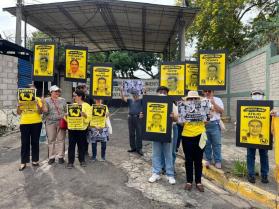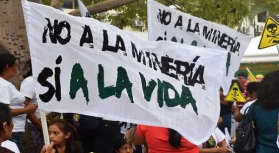Nine Student Protestors Followed and Brutally Arrested After Peaceful Protest
More than a thousand students and members of youth organizations mobilized outside of the University of El Salvador on Wednesday in a protest against the Anti-Terrorism Law and to demand an increase in government spending on education, specifically for the public university. The youth marched peacefully to the Legislative Assembly where they called for the repeal of the law and for increased funding for education. They then marched to the Supreme Court to demand the court declare the legislation unconstitutional, since it defines legal means of protest as "terrorist" acts punishable with decades in prison.
Police presence during the protest was minimal, creating an image ofthe police as keeping order and looking out for the well-being of eventhe protesters. However, after the activity finished, police followedleaders of the youth organizations and coordinators of this protest tothe surrounding municipalities where they live. There, the policearrested 9 of the youth including one minor. One youth leader was badlybeaten before they were transferred to a police station in yet anothermunicipality. The protesters are being charged with public disorder,carrying of weapons and resisting arrest. Those detained are still inpolice custody, with 2 lawyers handling the case. The youthorganizations that coordinated the activity will be holding a pressconference on Monday demanding the immediate release of the 9 captured.Social movement organizations are circulating electronic denouncementson the criminalization of youth protest and for the release of thosearrested.
U.S. Officials Urged Application of Repressive Laws
Days before, outgoing U.S. ambassador Douglas Barclay applauded theARENA governments achievement of approving the Anti-Terrorism Law andthe Law against Organized Crime. Barclay also urged governmentofficials to apply these laws and to create more repressive laws including authorization for domestic surveillance of phone calls under the pretense of fighting crime. The new US ambassador to ElSalvador, Charles Glazer, was officially accredited by President Sacabehind closed doors Wednesday. There was also a public welcomingceremony where Glazer expressed his enthusiasm to maintain andstrengthen the good relations between both countries.
Additionally, U.S. intervention in Salvadoran politics was evidenced bythe announcement of a bilateral agreement between the Attorney GeneralsSafie, from El Salvador, and U.S. Attourney General Alberto Gonzalez ina meeting held in Washington D.C. on January 26th. The agreementincluded the sharing of information between the agencies about thosedeported from the U.S. with any police records, although they were notclear about what this information will be used for. They also agreedthat the U.S. would send three permanent anti-gang advisers to ElSalvador. There will be a second meeting on February 5th between US andEl Salvador Attorney Generals in El Salvador, this time with theparticipation of Honduras and Guatemala officials, to further discussthe operative mechanisms for the implementation of these jointprojects. Salvadoran officials have also said that they want to signmore anti-crime agreements with the U.S., but that that Gonzalez isasking that El Salvador change its penal code to include life sentencesand the death penalty.
Government and Social Movement Present Contrasting Proposals on Water Administration
The president of the national water administration office, Cesar Funes,announced that the governments National Water Law proposal that wouldlead toward privatization has been handed in to the Presidents"Technical Secretary," which is the final step before it will bepresented to the Legislative Assembly for its approval. Water workersand other social organizations had days before presented their ownproposal that would guarantee the equal and sustainable access to waterfor the people of El Salvador. Additionally, the water workers unionhas been holding regular public forums in municipalities around thecountry as a means of public consultation and to present theirproposal. The focus of the unions work has been to increase awarenessof the water crisis in the country and promote organization as thesolution for defense and demand of water as a basic human right.

 "I am a CISPES supporter because continuing to fight for social justice and a more people-centered country means continuing the dream and sacrifice of thousands of my fellow Salvadorans who died for that vision.” - Padre Carlos, New York City
"I am a CISPES supporter because continuing to fight for social justice and a more people-centered country means continuing the dream and sacrifice of thousands of my fellow Salvadorans who died for that vision.” - Padre Carlos, New York City

